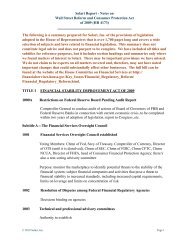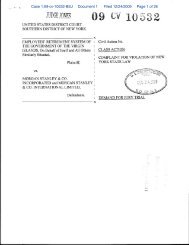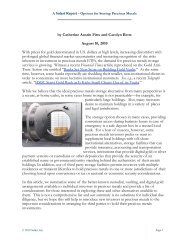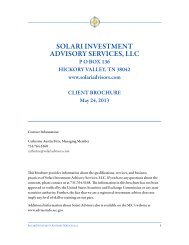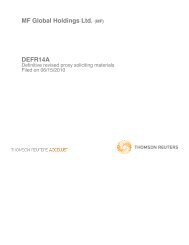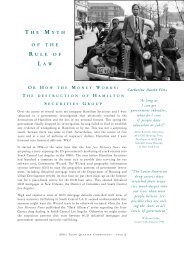Registration Statement on Form S-1 - Solari
Registration Statement on Form S-1 - Solari
Registration Statement on Form S-1 - Solari
Create successful ePaper yourself
Turn your PDF publications into a flip-book with our unique Google optimized e-Paper software.
<str<strong>on</strong>g>Registrati<strong>on</strong></str<strong>on</strong>g> <str<strong>on</strong>g>Statement</str<strong>on</strong>g> <strong>on</strong> <strong>Form</strong> S-1<br />
Table of C<strong>on</strong>tents<br />
http://www.sec.gov/Archives/edgar/data/1318605/000119312510017054/ds1.htm#toc51863_17<br />
2/18/10 10:17 AM<br />
frequent new vehicle announcements and changing c<strong>on</strong>sumer demands and behaviors. Factors that may influence the adopti<strong>on</strong> of<br />
alternative fuel vehicles, and specifically electric vehicles, include:<br />
• percepti<strong>on</strong>s about electric vehicle quality, safety (in particular with respect to lithium-i<strong>on</strong> battery packs), design,<br />
performance and cost, especially if adverse events or accidents occur that are linked to the quality or safety of electric<br />
vehicles;<br />
• the limited range over which electric vehicles may be driven <strong>on</strong> a single battery charge;<br />
• the decline of an electric vehicle’s range resulting from deteriorati<strong>on</strong> over time in the battery’s ability to hold a charge;<br />
• c<strong>on</strong>cerns about electric grid capacity and reliability, which could derail our past and present efforts to promote electric<br />
vehicles as a practical soluti<strong>on</strong> to vehicles which require gasoline;<br />
• the availability of alternative fuel vehicles, including plug-in hybrid electric vehicles;<br />
• improvements in the fuel ec<strong>on</strong>omy of the internal combusti<strong>on</strong> engine;<br />
• the availability of service for electric vehicles;<br />
• c<strong>on</strong>sumers’ desire and ability to purchase a luxury automobile or <strong>on</strong>e that is perceived as exclusive;<br />
• the envir<strong>on</strong>mental c<strong>on</strong>sciousness of c<strong>on</strong>sumers;<br />
• volatility in the cost of oil and gasoline;<br />
• c<strong>on</strong>sumers’ percepti<strong>on</strong>s of the dependency of the United States <strong>on</strong> oil from unstable or hostile countries, and government<br />
regulati<strong>on</strong>s and ec<strong>on</strong>omic incentives promoting fuel efficiency and alternate forms of energy;<br />
• access to charging stati<strong>on</strong>s, standardizati<strong>on</strong> of electric vehicle charging systems and c<strong>on</strong>sumers’ percepti<strong>on</strong>s about<br />
c<strong>on</strong>venience and cost to charge an electric vehicle;<br />
• the availability of tax and other governmental incentives to purchase and operate electric vehicles or future regulati<strong>on</strong><br />
requiring increased use of n<strong>on</strong>polluting vehicles;<br />
• percepti<strong>on</strong>s about and the actual cost of alternative fuel; and<br />
• macroec<strong>on</strong>omic factors.<br />
In additi<strong>on</strong>, recent reports have suggested the potential for extreme temperatures to affect the range or performance of electric<br />
vehicles. For example, certain recent reports have suggested that electric vehicles operated in colder temperatures may experience a<br />
reduced overall range as batteries may lose the ability to hold a charge more rapidly in cold weather. If such reports gain widespread<br />
acceptance, our ability to market and sell our vehicles may be adversely impacted.<br />
Additi<strong>on</strong>ally, we may become subject to regulati<strong>on</strong>s that may require us to alter the design of our vehicles, which could<br />
negatively impact c<strong>on</strong>sumer interest in our vehicles. For example, our electric vehicles make less noise than internal combusti<strong>on</strong><br />
vehicles. We are aware of advocacy groups, such as U.S. Nati<strong>on</strong>al Federati<strong>on</strong> of the Blind, which are lobbying for regulati<strong>on</strong>s to<br />
require electric vehicle manufacturers to adopt minimum sound standards. We believe the relative quiet of our vehicles is <strong>on</strong>e of its<br />
appealing aspects and any requirement to change this aspect may negatively affect c<strong>on</strong>sumer interest in our vehicles.<br />
The influence of any of the factors described above may cause current or potential customers not to purchase our electric<br />
vehicles, which would seriously harm our business, operating results, financial c<strong>on</strong>diti<strong>on</strong> and prospects.<br />
Page 34 of 300



